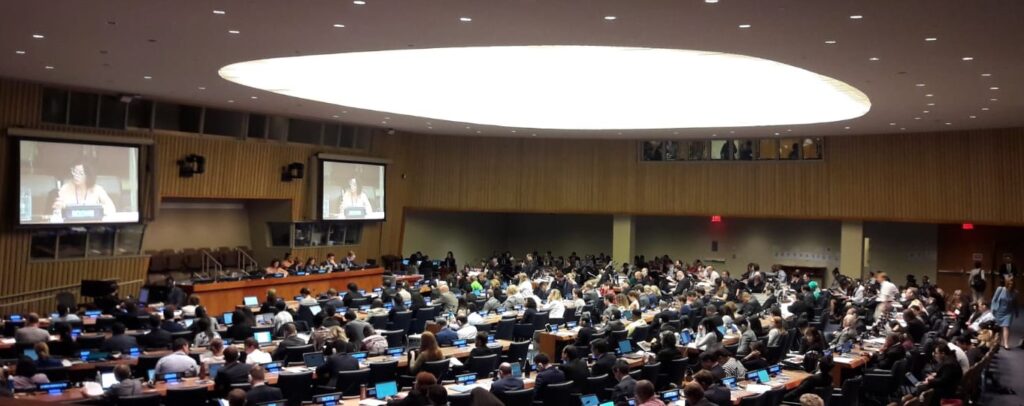Johannes-Alexander Müller, Ph.D. Ocean Policy Expert
E-diplomacy empowers, yet human encounters and personal relationships remain indispensable.
Virtual diplomacy – the new frontiers of the digital world
Empty conference rooms, but digital diplomacy in full swing. The COVID pandemic has undoubtedly slowed down diplomacy. However, it has not brought diplomacy to a standstill. On the contrary: without the physical limitations of travelling to a conference, the frequency of virtual webinars, expert group meetings and consultations seem endless. The policy calendar for 2020 is hence full. Still, the virtual form of diplomacy has its limitations.
After a relatively short period of adjustment in spring 2020, the countless conference-cancellations were replaced by online webinars, and even formal Conference of the Parties (CoP) – that is, meetings of the governing body of a convention – have now been moved online and are held through a variety of online providers and software applications designed for purpose. This was and is a novelty for almost all involved – or at least in this form it is. Deep appreciation is owed to the tireless efforts of the secretariats (and its staff) of international agreements for taking swift action and for preparing virtual platforms that have allowed negotiations and deliberations to continue online.
Besides the general concern that the world is upside down as a result of the pandemic and that environmental issues might be put on the backburner as other concerns are given more priority, a fundamental question that we have asked ourselves is whether conferences can (and should) be held exclusively online in the future. More to the point, can e-diplomacy lead to equivalent or even better results from the perspective of species, nature and environmental protection, including climate action?

Full conference room in 2019
The broad scope of diplomacy
After having had the opportunity to participate and observe e-diplomacy over the past six months, we now feel that it is time to reflect on its efficiency, albeit only preliminary conclusions can be drawn. Essential here is the distinction of the type of ‘conferences and meetings’, since it is this distinction that, we believe, will shape our evaluation of e-diplomacy thus far. But what do we mean when we write ‘conferences and meetings’? In essence, what is meant here are all multilateral consultations necessary for diplomatic negotiations, which ultimately lead to the final decisions taken in the course of conferences of the parties to international environmental treaties. More simply put: this encompasses technical, scientific and political working groups, committees, preparatory deliberations and the official Conferences of the Parties themselves.
In this context, a distinction must be made between meetings at expert level – where the focus is on the technical elements and implementation of the agreed provisions – and meetings where high-level diplomats negotiate new environmental obligations. The reason for this distinction is quite simple. Our experience has shown that direct interaction between participants in expert groups has not necessarily suffered from virtual diplomacy. However, this may not hold true if there are fundamental convergences among experts. It is also worth noting that expert level meetings were often scheduled on short-notice and in many cases clashed with other important online consultations. Given the large number of online meetings it seems increasingly difficult for the secretariats of international agreements to coordinate and keep track of other virtual meetings. The time-zone converter has also taken on a whole new meaning – participants have to show themselves increasingly flexible and willing to work well into the night (or early mornings) so as to accommodate colleges from New Zealand and the West Coast of the United States, for example. But there is also something positive to be drawn here: by shifting such meetings to virtual platforms, we reduce our carbon footprint and our travel expenses and at the same time.
With that said, a different picture however emerges when considering the meetings where new rules, norms and standards are being adopted, such as is the case at conference of parties that represent the highest governing body of an international convention. These conferences occur at periodic intervals and are intended to advance implementation of the objective of an agreement through its decisions. States retain the right to take action or to block these and there is hence a lot at stake. It is only natural that States have different interests that they try to assert internationally, but it also true that States are subjected to civil society observation. This is not a new development and it is an integral part of diplomacy and international relations. With that in mind however, online meetings make it very difficult for diplomats and civil society to overcome differences when they are sitting miles apart in front of a screen. Indeed, international diplomacy is strongly influenced by personalities, relationships and undoubtedly personal interactions: facial expressions, articulation, body language and persuasion are important components of international negotiations. Diplomacy therefore always has an interpersonal component to it.
Controversial decisions, which often have far-reaching geopolitical consequences, often take place in the corridors of conference venues, during coffee breaks and in informal discussions at dinner or elsewhere. This has however certainly changed with e-diplomacy. But we should be cautious in attributing a positive or negative label to this development. Yet, from our own experience, we can also claim that an e-mail is easy to ignore and putting forward positions or proposed policies on a virtual platform with hundreds of participants at a time does not allow for meaningful discussions to take place. In the comfort of one’s own four walls the boundaries of a negotiation mandate can more easily be extended than in the plenary under the watchful eyes of other delegates and civil society acting as a ‘Watch-Dog’. Much to our regret, past experiences have shown that conferences in person are no guarantee of success either, but the conclusion can be drawn that virtual negotiations give room for destructive and bad-faith behavior and that this certainly plays in the hands of countries pursuing nationalistic agendas and trying to block the adoption of a decision.
One ought to also not forget that if a Conference of the Parties or an intergovernmental conference is postponed, as has naturally been the case over the past few months, the momentum must be maintained for a long period of time. The final round of negotiations for the first legally binding High-Seas Treaty to govern areas beyond national jurisdiction was scheduled to take place in the early months of 2020. Diplomats and civil society have worked hard to keep the momentum for this once in a generation Treaty going for many years, but the supposed 100m sprint has now turned into an undefined marathon. More so, the second UN Ocean Conference, which was scheduled for June 2020, will also have to wait until further notice. 2020 should have been the “super year” for biodiversity. But the virus has snatched away the attention and prioritisation given to environmental protection. The planet was forced to take a back seat for now.
“Can you hear me?”
Yes, there have been immense advances in technology that enable us to communicate instantly around the world, whether by video or other communication channels. It seems that there are almost no limits to what is possible with technology. In recent months, there have been countless virtual meetings on a variety of platforms, which have allowed environmental diplomats to continue their work. We, too, as a non-governmental organisation with consultative status with the Economic and Social Council of the United Nations (ECOSOC) and as a partner to several regional agreements, have taken part in such e-meetings. In doing so, we have been given the opportunity to present our positions and to actively participate in the discussions.
However, the sentences “Can you hear me?”, “Please unmute so that we can hear you” or “Please mute your microphone so that the background noise does not disturb our work” have dominated such meetings. Although almost all countries have internet access, it is becoming increasingly clear to us that a stable internet connectivity is not a guarantee in some parts of the world. This is turn has the consequence that it is at times difficult to comprehend the contributions made by those that have weak internet signals and that the connection is frequently interrupted, which without a doubt interferes with the overall discussions. The time zone is also often Eurocentric and is a further challenge, especially for Pacific Island States, to name one example.
We further contend, that this development has broader implications for our efforts to address the impacts of climate change. To put it simple: Those countries that are most affected by climate change and who’s voices we urgently needed to be heard are often those countries that face limitations in terms of internet access. It goes without saying, that this conclusion likewise applies to civil society representatives from rather remote regions of the globe, but who are equally affected.
Empowerment and limitations
The COVID pandemic and its impact on multilateral conferences has shown that there is potential for reducing air miles. This particularly applies to the working-group level that gather in preparation to meetings of State parties, as well as for technical consultations and meeting of experts. We however also believe that e-diplomacy holds some advantages for civil society. Indeed, e-diplomacy empowers. The cost and time required to travel from one conference or meeting to another is a luxury that not all representatives of civil society and, unfortunately, not all countries can afford. However, an adequate internet connection is a prerequisite for this empowerment. There is therefore a great potential for reducing our carbon footprint through an inclusive e-diplomacy.
As citizens of Western industrialised countries [the European Union and Switzerland] we perhaps too rarely reflect on how easy it is to travel to other countries. We have the privilege of not having to go through expensive and lengthy visa procedures to attend conferences. Regretfully, this does not hold true for everyone, and so the shift of meetings to virtual platforms has given organisations the ability to make their voices heard in forums where they have previously gone unnoticed. This development is certainly welcome as it brings new perspectives to the negotiation process.
International diplomacy has gone digital and there should be little doubt that this transformation, while maybe not to this extent, will continue once the pandemic is over. With the help of the internet and information technologies, governments have been able to continue their work and to save on travel costs, for which the environment will certainly not shed any tears. Equally clear, as our experiences have shown, there are limitations and considerable short-comings to e-diplomacy. The personal interaction between diplomats and other stakeholders remains critical, not only to bridge differences and reach agreement but also to break down lasting blockades. It is also particularly important for civil society to have a transparent access to negotiations.
In a world where countries are perceivably becoming more inwardly focused and where national interests more often than not seem to take precedence over the common good, human encounters and personal relationships remain indispensable. This however does not mean that it is an ‘either-or’ scenario. In fact, we do understand that the future of conferences is a mix of both personal presence and virtual access, where transparency and ecological efficiency build the core of the priorities. Finding compromises to overcome differences or to persuade one another of the benefits of one’s own proposal of how the international community should approach environmental degradation requires complex negotiations. These are very dynamic and at times complicated and the virtual world does not necessarily provide a conducive environment to overcome such obstacles.
